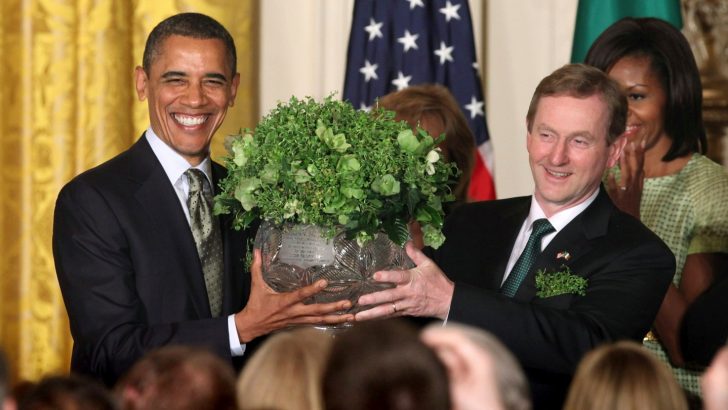“a crisis is also often an opportunity, and a chance to re-focus on the roots and reasons of a custom and a tradition”, writes Mary Kenny
Considering that so many Irish people vehemently object to the policies of President Donald Trump – especially towards migrants – should Taoiseach Enda Kenny cancel the usual trip to Washington to present the traditional bowl of Shamrock on St Patrick’s Day? Here’s a dilemma much mooted in the public realm.
Perhaps this is an opportune time to take a pause and discuss the practice – some might even call it a mania – for Irish politicians travelling to all quarters of the earth on March 17, leaving the impression that no one is actually governing the country at home. (The civil servants are running it, but then they do that anyway.)
Investment
This is, we know, a blatant exercise in ‘selling Ireland’ – advancing Ireland as a ‘brand’, and a source of investment and trade.
Fine; almost anything that generates employment is to be welcomed.
But it’s interesting that the original purpose of St Patrick’s Day has almost wholly been superceded by the merchandising element.
Those who say that the Taoiseach absolutely must be in Washington with that bowl of shamrock claim it is essential for Ireland’s trading situation.
Poor old St Patrick himself seldom gets a look-in. That Patrick associated the shamrock with the Holy Trinity has been largely forgotten. Indeed, many people probably don’t even know about it. Just as many people don’t know that Patrick was a unifying, not a dividing, force between Irish Christians – always accepted as much by Protestants as Catholics.
In the end, whether the Taoiseach presents that shamrock gift in Washington on March 17 is a question for the government (and I have little doubt that they will decide to continue the usual practice, and brush aside calls to cancel it).
But a crisis is also often an opportunity, and a chance to re-focus on the roots and reasons of a custom and a tradition: an examination of first principles, and an exercise in ‘back to basics’.
Perhaps Christian Ireland should more energetically affirm its position in reclaiming the spirit of St Patrick, and reminding those debating the point of how all this began. It wasn’t the political class plying for trade which spread Patrick’s Day around the world: 800 church bells rang out around the globe to mark the evangelisation of our country.
It might be nice for a representative of Patrician Ireland to bring a bowl of Shamrock to St Patrick’s Cathedral in New York, so aptly named for the patron saint of the Gael.
Jackie’s ‘Father Confessor’
One of the last performances by the actor Sir John Hurt – who died of pancreatic cancer on January 27, aged 77 – was as the priest, Fr Richard McSorley, to whom Jacqueline confided in the sorrowful period after President Kennedy’s assassination in 1963.
Hurt gave a characteristically sensitive and thoughtful performance in the movie, Jackie, which was otherwise, I thought, fairly interesting but rather thin.
Mrs Kennedy was in the habit of seeking counsel from father-confessors. Between 1950 and 1964, she corresponded with the Irish Vincentian, Fr Joseph Leonard (the correspondence only came to an end on his death). Controversially, her letters were to be sold at auction in 2014 – expected to fetch $1.3 million – but the Kennedy family objected, and the Vincentian order withdrew, out of respect for the family’s wishes.
It would be fascinating to read the full correspondence, just as an historical artefact. Perhaps some decades into the future they will be made available.
Striving for excellence
I attended Sunday Mass last weekend at a North London parish, conducted by a solid Irish priest with a strong voice and a natural air of authority. There was a lot of cheerful music from the assembled choir of young people playing fiddles, piano and guitar, and an impressive attendance of young families.
“Full house,” I remarked to my neighbour in the pew.
“There’s a very good school attached,” he replied.
I see nothing wrong with successful faith schools attracting parents to church. Faith schools should strive for excellence at every level. Didn’t St Angela de Merici pioneer the education of girls by teaching her pupils so well that many sought the gift of instruction from the Ursuline nuns?
Denying motherhood
The British Medical Association has stated that pregnant women should not be called ‘expectant mothers’, as calling a ‘pregnant person’ female might offend transgender people.
The phrase ‘political correctness gone mad’ really does come to mind.
To deny that ‘pregnant persons’ are female is flying in the face of biological science.
To deny ‘motherhood’ to women is, surely, far more offensive to mothers and to women. Motherhood has been exclusive to females since the dawn of time, and women are entitled to claim it with pride and to be accorded respect, too, for their maternity.


 Mary Kenny
Mary Kenny An Taoiseach Enda kenny Presenting the then US President Barack Obama with a bowl of shamrock.
An Taoiseach Enda kenny Presenting the then US President Barack Obama with a bowl of shamrock.